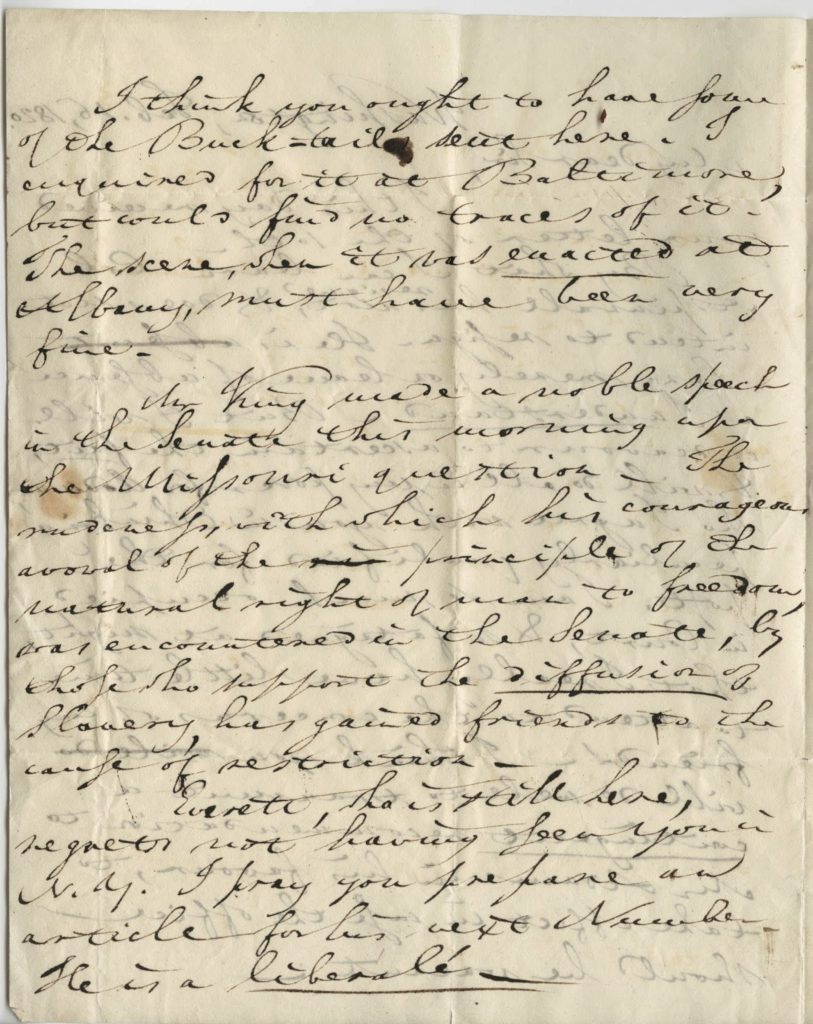For the past five years we have been remembering the 100th anniversary of the Civil War (check out Today in The Civil War to enjoy our holdings), but today marks the 195th anniversary of an important milestone in the long-term lead up to the war: the Missouri Compromise. On March 6, 1820, James Monroe signed bills agreeing to Maine’s admission to the Union as a free state and Missouri as a slave state and establishing 36′ 30 as the demarcation line between free and slave areas in the Louisiana Territory.
The Missouri Compromise was a critical attempt to resolve questions about the expansion of slavery, the balance of power between free and slave states, and the ability of the federal government to make laws concerning slavery. With such contentious issues on the table, many were not satisfied with the outcome. Thomas Jefferson, who held that slavery was a question best reserved to the states, famously wrote that:
[T]his momentous question, like a fire bell in the night, awakened
and filled me with terror. I considered it at once as the knell
of the Union. it is hushed indeed for the moment. but this is
a reprieve only, not a final sentence. a geographical line, coinciding
with a marked principle, moral and political, once concieved and
held up to the angry passions of men, will never be obliterated;
and every new irritation will mark it deeper and deeper.
 |
| Thomas Jefferson to John Holmes, April 22, 1820. Thomas Jefferson papers. Library of Congress. |
If Jefferson represented a southern opinion, the Rosenbach has a document that speaks to northern concerns. Rufus King, who had been a member of the Constitutional Convention and was then a senator for New York, was a leader of northern anti-slavery opposition to the compromise. He believed that Congress could not only regulate slavery, but also that it should restrict it completely from the territories. The Rosenbach’s collection includes a letter from the lawyer, diplomat, and Supreme Court reporter Henry Wheaton to his friend in New York politics, approving of King’s efforts as the bills were debated.
 |
| Henry Wheaton to Gulian Verplanck. 16 February 1820.AMs 781/23. The Rosenbach of the Free Library of Philadelphia. |
Mr. King made a noble speech in the Senate this morning upon the Missouri question. The rudeness with which he his courageous avowal of the principle of the natural right of man to freedom was encountered in the Senate by those whose support of the diffusion of slavery, has gained friends to the cause of restriction.
Although many were dissatisfied, the Missouri Compromise, crafted by Henry Clay and enacted 195 years ago today, managed to hold the country together
for thirty years. But, in the end, Jefferson’s claim that it was only a reprieve proved true. The compromise fell apart in the tumultuous 1850s and opposition to its successor bill, the Kansas-Nebraska Act, which provided for
popular sovereignty, would be vehement and bloody and would provide a rallying cry for the new Republican
party.
 Kathy Haas is the Associate Curator at The Rosenbach of the Free Library of Philadelphia and the primary poster at the Rosen-blog.
Kathy Haas is the Associate Curator at The Rosenbach of the Free Library of Philadelphia and the primary poster at the Rosen-blog.
